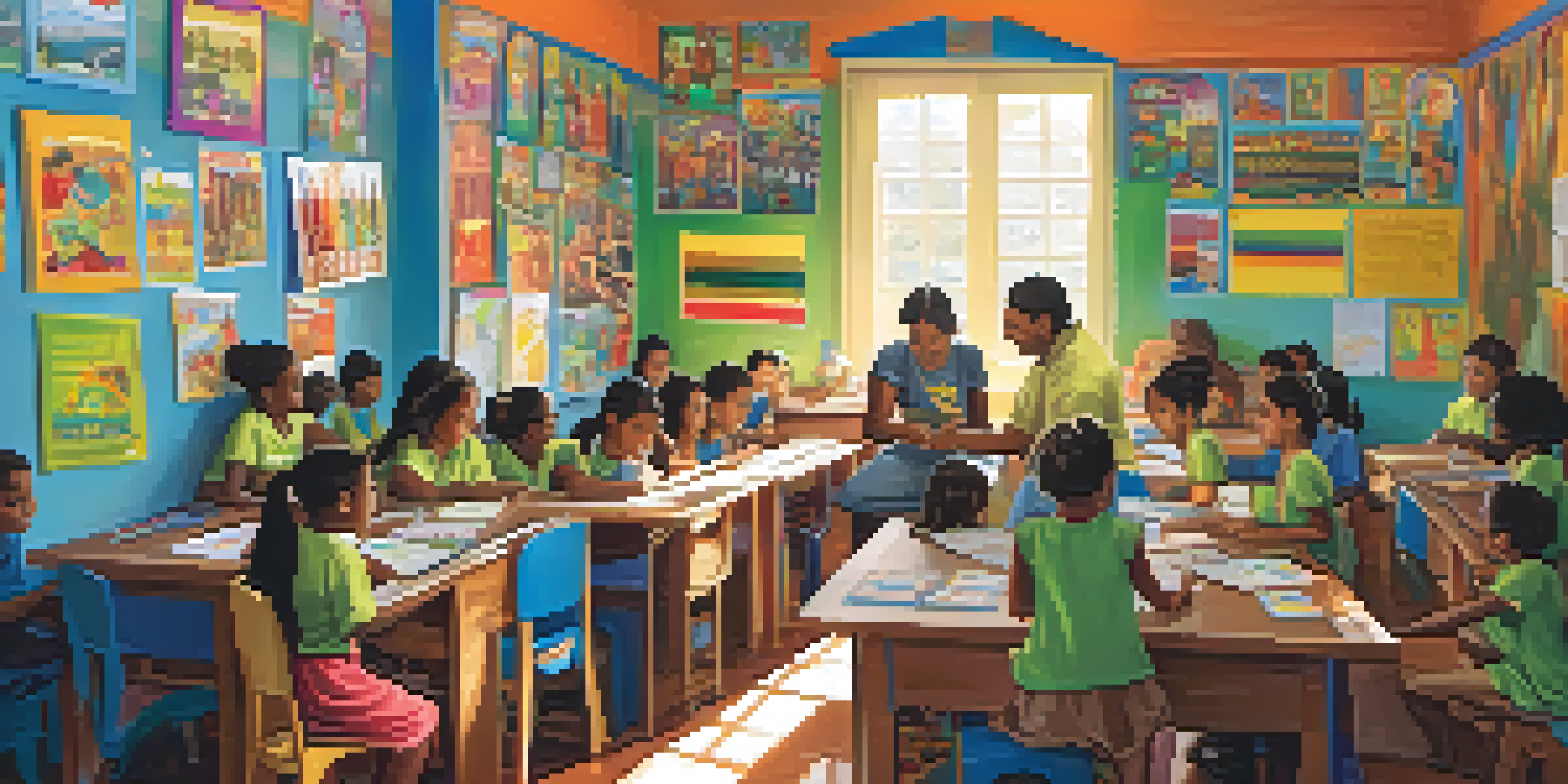Voluntourism in Brazil: Giving Back Through Sustainable Travel

Understanding Voluntourism: A Blend of Travel and Service
Voluntourism is a unique travel approach that combines tourism with volunteer work. It allows travelers to engage with local communities while making a positive impact. Imagine enjoying the vibrant culture of Brazil while helping to conserve its stunning landscapes or support local education programs.
The best way to find yourself is to lose yourself in the service of others.
This travel trend has gained popularity as more people seek meaningful experiences beyond traditional sightseeing. It’s about immersing yourself in a destination and contributing to its well-being. For instance, volunteers might work on community farms or assist in wildlife conservation projects, all while learning from locals.
Voluntourism not only benefits the communities but also enriches the travelers’ experiences. Those who participate often return home with a deeper understanding of cultural nuances and personal growth. It’s a win-win situation, where both visitors and locals gain valuable insights and benefits.
Why Brazil? A Country Rich in Diversity and Need
Brazil stands out as a prime destination for voluntourism, thanks to its diverse ecosystems and vibrant cultures. From the lush Amazon rainforest to the colorful streets of Rio de Janeiro, there’s something for everyone. However, this beauty comes with challenges, including poverty and environmental threats.

Many Brazilian communities face socio-economic issues that can be alleviated through the support of volunteers. For example, educational initiatives are in high demand, as local schools often lack resources. By participating in educational programs, volunteers can help bridge this gap and empower children for a better future.
Voluntourism Combines Travel and Service
This unique approach allows travelers to engage with local communities while making a positive impact.
Moreover, Brazil’s environmental challenges, such as deforestation and wildlife conservation, present numerous opportunities for impactful volunteer work. Eco-tourism projects are essential in preserving the unique biodiversity of the region. Volunteers can engage in reforestation efforts or help protect endangered species, making a tangible difference.
Types of Voluntourism Projects in Brazil
In Brazil, voluntourism projects vary widely, catering to diverse interests and skills. Travelers can choose from areas like education, environmental conservation, and community development. This flexibility allows participants to find projects that resonate with their passions and expertise.
Volunteering is at the very core of being a human. No one has made it through life without someone else’s help.
For instance, those interested in wildlife might volunteer at a sanctuary for rescued animals, helping with care and rehabilitation. Alternatively, individuals who love teaching can contribute to local schools, providing English lessons or tutoring in various subjects. Each project offers a unique way to engage and make a difference.
Moreover, there are opportunities for those who wish to focus on health and wellness. Volunteers can work alongside local health professionals, addressing public health challenges. This hands-on experience not only supports communities but also offers invaluable learning for the volunteers.
The Impact of Voluntourism on Local Communities
The impact of voluntourism on local communities in Brazil can be profound and long-lasting. By providing essential services and resources, volunteers help improve the quality of life for many residents. This support often leads to increased community resilience and empowerment.
Moreover, voluntourism fosters cultural exchange, allowing travelers and locals to learn from each other. Volunteers often gain insights into local traditions, while community members benefit from new perspectives and knowledge. This exchange can lead to stronger relationships and mutual respect.
Brazil's Rich Opportunities for Impact
Brazil offers diverse voluntourism projects in education and environmental conservation, addressing significant local needs.
However, it’s crucial that voluntourism projects are conducted ethically, ensuring that the needs of the community come first. Sustainable practices and local involvement are key to ensuring that the benefits are lasting and meaningful for everyone involved.
Preparing for Your Voluntourism Journey in Brazil
Preparation is essential for a successful voluntourism journey in Brazil. Start by researching various programs to find one that aligns with your interests and values. Look for organizations that prioritize community needs and have a track record of positive impact.
Additionally, consider the logistics of your trip, including travel arrangements, accommodations, and any necessary vaccinations. Being well-prepared will help you focus on the experience rather than logistical challenges. Don’t forget to pack appropriately for your chosen project, whether that means bringing teaching materials or eco-friendly supplies.
Finally, approach your trip with an open mind and a willingness to learn. Each community has its unique culture and challenges, and being adaptable will enhance your experience. Embrace the opportunity to connect with locals and immerse yourself in the rich tapestry of Brazilian life.
Challenges of Voluntourism and How to Overcome Them
While voluntourism offers rewarding experiences, it’s not without its challenges. One major concern is the potential for volunteers to inadvertently disrupt local economies or social structures. It’s crucial to engage with communities to ensure that efforts are genuinely beneficial and respectful.
Another challenge can be the emotional toll of witnessing poverty and hardship. Volunteers may feel overwhelmed or helpless at times. To address this, it’s essential to maintain a positive mindset and focus on small, achievable goals. Remember, even minor contributions can lead to significant change over time.
Ethical Practices are Crucial
Ensuring voluntourism projects prioritize community needs fosters sustainable benefits and meaningful cultural exchange.
Lastly, volunteers should be prepared for cultural differences and language barriers. These can lead to misunderstandings, so being patient and open to learning is vital. Engaging with locals and seeking advice can help bridge these gaps and enhance the overall experience.
The Future of Voluntourism in Brazil
As the trend of voluntourism continues to grow, Brazil is poised to become a leader in sustainable travel practices. With increasing awareness of social and environmental issues, more travelers are looking for ways to give back during their journeys. This shift presents exciting opportunities for communities and organizations alike.
In the coming years, it’s likely that voluntourism will evolve, incorporating more technology and innovative solutions to connect volunteers with projects. Online platforms may emerge, streamlining the process of finding and participating in meaningful projects. This could make voluntourism more accessible for a broader audience.

Ultimately, the future of voluntourism in Brazil hinges on collaboration between travelers, local communities, and organizations. By working together, we can ensure that voluntourism remains a force for good, fostering sustainable development and enriching lives on both sides of the experience.